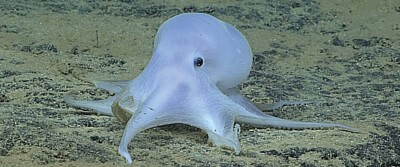Newly Discovered Octopus Imperiled by Deep-Sea Mining Plans

By Steven Steinfeld
A semi-transparent species of octopus — nicknamed Casper after the cartoon ghost — was discovered last spring near Hawaii, but scientists are now concerned for their survival. They lay eggs in areas where companies want to mine for valuable metals that are used in our electronic devices.
Marine ecologist Autun Purser explored the South Pacific’s deep seafloor, where rocky nodules containing valuable manganese are common, in 2015. "The nodules grow like pearls," said Purser. "They usually start growing over a shark's tooth or a bit of broken shell. Slowly […] they form layers of rock." The layers often include scarce metals that are used in making cellphones and computers.
The metals’ land deposits have been mined already, so the sea is the next frontier. But mining teams could disrupt the environment and endanger these rare octopuses. "We thought we should try to understand what animals are in the area before we start mining," said Purser.
Eggs on Nodules Containing Valuable Metals
His team’s swimming robot covered the seafloor over 4 kilometers (or 2.5 miles) below the surface. The robot’s camera took pictures of 29 octopuses from two different species. Some were curled around eggs that had been laid on dead sea sponges that were clinging to the nodules. This guarding or "brooding" behavior can continue for more than a year.
Daniel Jones, marine biologist at England’s National Oceanography Centre, says Purser's work "is critical for enriching our understanding of this poorly-known deep-sea environment.” Purser’s team is also comparing plowed and unplowed sites. Early findings indicate that harvested nodules do not return, even after decades. Without the nodules, there would be no attached sponges and therefore no place for an octopus to lay eggs.
Future deep-sea metal mining may take place across the seafloor, destroying the ecosystem where these octopuses live. If companies must mine, Purser hopes it’s in small patches and that many nodules are preserved. "It would be nice to say don't do any mining,” he observes, “but we all use mobile phones.”
Discussion Questions
- Why is it important to preserve rare species like these octopuses?
- What steps should be taken before any seafloor mining begins?
- Ecosystem
- Environment
- Manganese